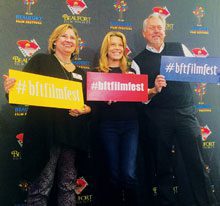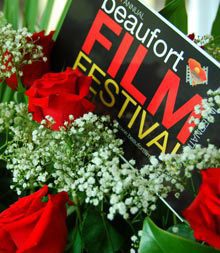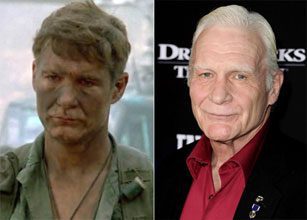Filmmaker Kevin Breslin shoots Occupy Wall Street from the inside out.
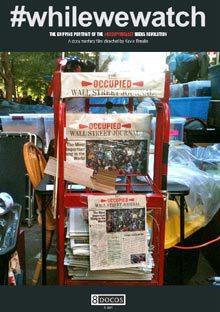 Kevin Breslin is standing on a street corner somewhere in Manhattan shouting into a cell phone. Filtered by street noise and a thousand miles between us he sounds vaguely like Joe Pesci. Last year Breslin’s documentary “Living for 32” made it’s South Carolina debut at BIFF. The inspirational story of Colin Goddard, a survivor of the 2007 Virginia Tech massacre, was also nominated for an Academy Award.
Kevin Breslin is standing on a street corner somewhere in Manhattan shouting into a cell phone. Filtered by street noise and a thousand miles between us he sounds vaguely like Joe Pesci. Last year Breslin’s documentary “Living for 32” made it’s South Carolina debut at BIFF. The inspirational story of Colin Goddard, a survivor of the 2007 Virginia Tech massacre, was also nominated for an Academy Award.
This year Breslin’s gracing the Beaufort International Film Festival with a film some critics are calling one of the most important documentaries in recent years. “#WhileWeWatch” is an inside look at the people and the passion behind the Occupy Wall Street movement. Breslin says the film is “the real experience of what democracy looks like.”
“#WhileWeWatch” makes its world festival premier at BIFF.
LET NEW VOICES BE HEARD
Mark Shaffer: Stripped to its most basic elements, this film is simply about our First Amendment 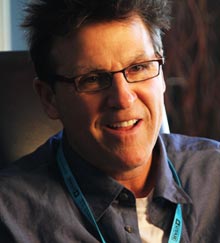 rights as American citizens – it’s about everyone’s right to speak out.
rights as American citizens – it’s about everyone’s right to speak out.
Kevin Breslin: The idea behind this movie is to let new voices be heard, whether mainstream media respects it or not. Regardless of their enterprise – meaning even if you’re not part of a mainstream media company – you should still be allowed to have complete access to freedom of the press and freedom of information. These people are attempting to tell a story without the basic tools that most journalists have, especially in New York – press passes from the NYPD and access to go places. These guys didn’t have those credentials but they took over a park and put up tents and got themselves wi-fi and some cameras and went to work. They created a newspaper as well as blogs and websites. Somebody was tweeting every minute of the day. So, within the park they became this mini communications empire all through ingenuity.
(Laughs)
It’s like this group of renegades just got together and said “we’re going to create a miniature media empire in this park in the cold and snow and rain, in spite of all odds.” And they did it. They did it brilliantly. Whether you applaud their idea or not their media instincts were brilliant. And their promotional instincts were brilliant.
MS: Looking at this from the inside out, was it your perception that a lot of them had professional experience in media or marketing?
KB: No. Here’s what happened. I went there with the cameras to make a documentary about the whole movement. That’s a tall order. Everyone’s got an idea or an agenda – emotional, political or socio-economic. I started watching how people were communicating with the press and I noticed there was one guy who had a notepad and pen in his hand. I asked him what he did and he asked me what I did. I told him I was making a film. He asked if I was press and I said no. Because I wasn’t press he actually trusted me a little bit. His name was Lloyd Perry and he was PR because he had a little bit of a public relations background.
I met another guy who was filming and he had a bit of a film school background. He was live streaming. I didn’t even know what live streaming was. As a filmmaker I don’t live stream. He explained he had an application on his cell phone that allowed him to stream everything out live to the world. I was like, wow. Brilliant.
The girl who was writing the newspaper had a bit of experience. But most of them didn’t have any journalism experience or training; they just had a lot of intelligence. These are very, very smart people. And they had drive. They came from all walks of life. They were all obsessed with gathering information and getting it out there and not trusting anyone else, meaning the mainstream media. They decided they had to tell their own story. Conditions were miserable. There was an early snow. It rained. It was colder then than it is now. But they never stopped pumping out the information.
They beguiled the police department. They filmed all the cops when the cops got rough and pepper sprayed and used billy clubs during the marches. They immediately turned the cameras on the cops and screamed at them “The whole world is watching! The whole world is watching!” And that’s why I called the film “While We Watch.”
MS: What were those situations like for you?
KB: I was there as a director. So, I was careful. I’m not getting pepper sprayed or hit. I was very objective – just tried to peek in and peek out and capture real footage about all the events. At one point we had five cameras going. We had two inside the park during the raid. Nobody had that because the police had a blackout.
MS: I read a review of the film by a guy who comes from a family of New York’s Finest. He went in wanting to hate the film and ended up instead being outraged by what the police did. The NYPD doesn’t come off too well in this.
KB: I’m cautious about that. They don’t come off well. And no one comes of well anywhere or any time they start abusing people who are using the most basic right of anybody – no matter what your political leanings are – and that’s the right of free speech, and the freedom of the press. Those streamers and bloggers and writers were all there making sure everyone got their side of the story. And there was a segment of the police – not all of them – who tried to inhibit that. This is a democracy and when that happens you’re playing in a really dangerous area.
MS: There’s a point in the film when someone says, “We came in peace. The police showed up to riot.”
KB: That’s one guy’s point of view. I’m a filmmaker and of course I am in that 99%. I had to be very disciplined. The easiest thing for me to do was to lash on to the agenda and start marching with them – rah, rah! I did not do that. That’s why we got the one and only interview with Paul Browne who is [Police Commissioner] Ray Kelly’s chief of media information in this city. He speaks for the city.
Paul saw our film and said, “I want to speak to you about this.” The reason he was speaking to us was that he though I did a balanced job in showing what I could from my perspective. However, he wanted to show us what he had. He said, “We had cameras pointed the other way at these guys and you didn’t see a cop get smashed in the face, you didn’t see some guy get liquid thrown in his face.”
As a filmmaker I thought it was important to show the whole story. That’s why I tried to balance it out. Ironically, the police were more open than a lot of the media companies. The people in the park didn’t like the New York Times at all.
MS: Interesting.
KB: The Times started it with that supercilious first column claiming that they were lazy and had no point of view, they don’t have an agenda – it’s just a bunch of malcontents out there in the park. Well, they took umbrage with that. I will tell you this about everybody in that park: they are smarter than hell. Whether you liked them or not these people were very, very smart – all of them. And that I was very impressed with. And that’s why they got their story out to the world every day.
MS: The world is key. It’s been pointed out many times that while most of the mainstream U.S. media either blew this off as a joke or demonized it, the rest of the world – including China’s media – picked right up on the deeper implications. Why?
KB: (Laughs) Why? I’ll tell you why. I used the word “supercilious.” Maybe that’s an angry word to use. I think they’re a very dismissive group. I mean you walk around with a badge on that says “Press” in New York City and I think you start to believe the myth that you’re the only one who can tell a story, that you’re the only one competent enough.
The people in Zuccotti Park dismiss that. They basically said [to the mainstream media], “You can’t tell me that I can’t tell my story.” And this is the quote they gave me, “I am a Citizen Journalist.” I’d never heard that. And they meant it. They told me, “This is my weapon of information – this freaking cell phone camera.” Record everything, document it, put it up on Youtube or whatever – just get it out. Name a channel of communication and they used it. They missed nothing.
In the future, I think mainstream media have to be very aware that when the next big story breaks this is what’s going to happen.
MS: Let’s jump ahead five years and look at this film. Do you think what you’ve documented is the beginning of the end of mainstream media?
KB: Oh boy, that’s a great question! I thought about that, but it would take tremendous arrogance for me to think that. I don’t know. Is it a threat to the mainstream media paradigm? Certainly. Certainly. But there is a point where professionals get paid and you need an editor to make sure things are objective and truthful.
MS: Since you brought up objective and truthful, there’s a pretty funny moment with one of the Occupy guys pretending to shoot the Fox News crew with a fake camera that’s just beautiful.
KB: (Laughs) Yeah, yeah. Fake camera for fake news. I had to laugh. There’s a good bit of humor in the film. I tried to keep as much in as possible.
MS: As a documentary filmmaker you put yourself in the eye of the storm – you’re recording history as it happens. Zuccotti Park’s probably not going to happen again…
KB: Do you know the nerves I had? You’re absolutely right. The pressure’s tremendous. I was a wreck every day wondering where’s this going to go? If something goes down do we have it covered? Is this a waste of time? How do you tell this story? There’s no ending to it. Everybody’s going “you don’t have an ending!” And all of a sudden, kaboom! They raided the park. They raided it at 1:30 in the morning. No one was ready for that. They’ve been forced out and their library’s been ripped apart and all their clothing’s been thrown into garbage trucks.
As a story teller you kind of move around in a circle wondering where the story’s going, looking for an ending. And in many ways [Mayor] Bloomberg helped write an ending to this chapter of the Zuccotti Park story.
(Sirens in the background0
In fact there goes Bloomberg now, wizzing right by me in his motorcade of SUV’s – brand new black Caddies.
MS: Somehow an ironic and appropriate conclusion.
“#WhileWeWatch” premiers at BIFF Friday, February 17th at 2:30 pm at the USCB Center for the Arts, 801 Carteret Street, Beaufort. Purchase tickets at the door or online at www.beaufortfilmfestival.com.

